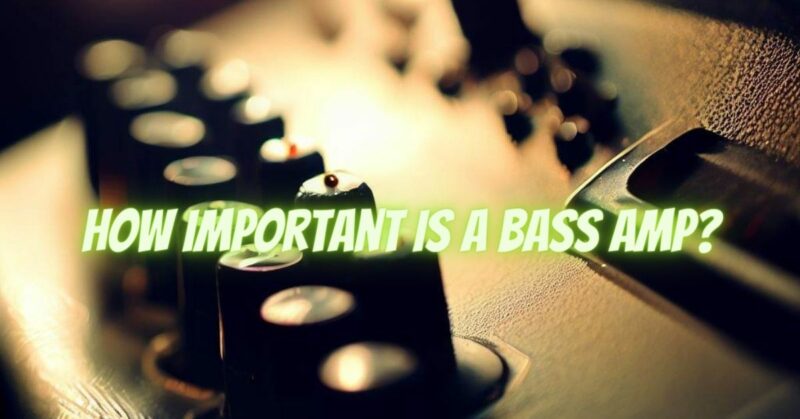When it comes to the world of music, each instrument has its unique requirements for amplification and sound reproduction. For bassists, a dedicated bass amp plays a pivotal role in shaping their tone, providing power, and ensuring the fundamental frequencies of the bass guitar are heard with clarity and impact. In this article, we will delve into the importance of a bass amp in the context of bass playing, highlighting its key functions and discussing why it is an essential tool for bassists.
- Tone Shaping and Character:
A bass amp is specifically designed to reproduce the low-frequency range produced by a bass guitar. It enables bassists to shape their tone and define their instrument’s character. Bass amps offer various tone controls, including bass, mid, and treble, allowing bassists to tailor the sound to their preferences and adapt to different musical genres and playing styles. By using a bass amp, bassists can emphasize the rich and deep qualities of their instrument, ensuring a distinct and powerful presence in the overall mix.
- Amplification and Projection:
Bass guitars produce lower frequencies compared to other instruments, and these frequencies require specialized amplification to be properly heard. A dedicated bass amp is designed to handle the low-end demands of the bass guitar, delivering the necessary power and headroom to accurately reproduce and project the full spectrum of bass frequencies. The size and configuration of the speaker cabinets in bass amps are optimized to produce deep, resonant tones with sufficient volume and clarity, ensuring that the bassist’s playing is felt and heard in a band or live performance setting.
- Low-End Definition and Clarity:
The low-end frequencies produced by a bass guitar provide the foundation and drive for a song. A quality bass amp helps maintain the integrity of these frequencies, ensuring they are reproduced with clarity, definition, and articulation. A bass amp with a well-designed speaker system and appropriate power rating allows the bassist to articulate their playing nuances, enabling the distinct bass lines to cut through the mix and provide a solid rhythmic backbone for the music.
- Dynamic Range and Articulation:
A bass amp contributes to the dynamic range and articulation capabilities of a bassist. It allows for expressiveness in playing by faithfully reproducing the subtle variations in attack, sustain, and release. A responsive and well-designed bass amp ensures that the nuances of the bassist’s technique are accurately conveyed, whether playing soft and delicate passages or delivering powerful and punchy bass lines. This level of dynamic responsiveness adds depth and musicality to the bass performance.
- Personal Connection and Inspiration:
Beyond the technical aspects, a bass amp serves as a source of inspiration and connection for the bassist. The tone and feel of a well-matched amp can inspire creativity, motivate exploration of different playing techniques, and enhance the overall playing experience. A bassist develops a personal relationship with their amp, finding the right balance of tone, power, and responsiveness that resonates with their musical vision and style.
Conclusion:
The importance of a bass amp for a bassist cannot be overstated. It is a fundamental tool that shapes the tone, amplifies the low-end frequencies, and ensures clarity, definition, and projection for the bass guitar. A dedicated bass amp allows bassists to express their musicality, contribute to the rhythmic foundation, and enhance the overall sound of a band or musical ensemble. It is not just an amplification device, but an instrument in itself that enables bassists to create, connect, and bring their music to life.


